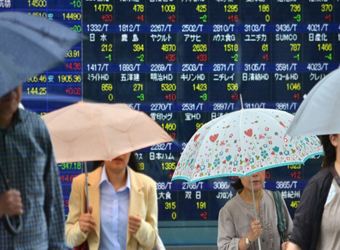Asian markets rose across the board on Friday, ahead of the crucial U.S. nonfarm payrolls data due later in the global day.
The session in Asia followed another positive close in U.S. equities overnight.
Australia’s ASX 200 advanced 58.93 points, or 1.04 percent, to 5,710.7, with all but the utilities sector closing in positive territory.
The heavily weighted financial subindex rose 1.14 percent as the country’s so-called Big Four banks advanced. Shares of ANZ rose 1.34 percent, Commonwealth Bank was up 1.3 percent, Westpac was higher by 1.32 percent and National Australia Bank climbed 1.13 percent.
In Japan, the Nikkei 225 closed up 62.15 points, or 0.3 percent, at 20,690.71, while the Topix index advanced 4.67 points, or 0.28 percent, to 1,687.16.
Hong Kong’s Hang Seng index was up 0.22 percent in afternoon trade, after the market returned to trade following a public holiday on Thursday. Meanwhile, India’s Nifty 50 and Sensex rose 0.72 percent and 0.54 percent, respectively.
Markets in China and South Korea remained shut for public holidays.
“The global economy is looking stronger and stronger and this is driving profits all at a time when inflation and central banks remain relatively benign,” Shane Oliver, head of investment strategy and chief economist at AMP Capital, wrote in a note, explaining why global share markets overlooked the uncertainties and negative headlines this week.
“U.S., Eurozone and Japanese shares saw good gains over the last week but Australian shares remained relatively weak reflecting a relatively less positive growth and profit outlook,” Oliver added.
Following the devastation caused by Hurricanes Harvey and Irma, market watchers think as many as 125,000 jobs stateside may have been wiped from the September employment report.
Investment bank Goldman Sachs said in a note it expects nonfarm payrolls growth to have slowed to about 50,000 new jobs added in September, which it noted was below consensus forecasts of around 80,000 as well as the three-month average of around 185,000.
“Our forecast reflects the widespread flooding and power outages caused by Hurricanes Harvey and Irma, which affected over 10 percent of the population and caused over $100 billion in damages,” analysts at Goldman wrote, although they added the impact on the figure was “highly uncertain.”
The U.S. dollar advanced against a basket of currencies to trade as high as 94.112, rising from levels near 93.500 on Thursday afternoon Asia time. As of 3:03 p.m. HK/SIN, the dollar index traded at 94.069.
Kathy Lien, managing director of foreign-exchange strategy at BK Asset Management, said the dollar strength should not “catch anyone by surprise” following strong non-manufacturing ISM numbers, which indicated the U.S. labor market and services sector were not as adversely affected by the hurricane season as some may have thought.
“What was unexpected was the market’s disregard for the data on Wednesday, but they finally came to their senses today thanks in part to hawkish comments from Fed Presidents Harker and Williams, who pointed to the improvements in the economy as reasons why the Fed needs to continue raising interest rates,” Lien wrote in a morning note.
Among the currency majors, the Japanese yen traded at 113 to the dollar, weakening from an earlier high of 112.74.
The Australian dollar fetched $0.7761, slipping from an earlier high of $0.7798. The drop in the Aussie came after Reserve Bank of Australia (RBA) board member Ian Harper said in a Wall Street Journal interview that while the recent slump in the country’s retail sales is not a cause for immediate concern, the RBA hadn’t entirely ruled out further interest rate cuts.
Harper said that if household income growth loses momentum, that might be the basis for “some sort of policy action,” according to the report.
At its meeting earlier this week, the Australian central bank left the cash rate unchanged at a record low of 1.5 percent for the 14th straight month.
Meanwhile, the euro traded at $1.1695, slipping from above $1.1760 earlier in the week.
The British pound traded at $1.3063, falling from an earlier session high of $1.3124.
The pound is “still weakening as uncertainty intensifies over U.K. PM [Theresa] May’s future,” strategists at Macquarie Bank wrote in a Friday note. “In normal times, this would be largely a domestic affair and the British pound could turn a blind eye. But a leadership challenge now would be a clear pound-negative.”
The Macquarie strategists said a leadership challenge could delay Brexit negotiations, lead to a less compromising approach to negotiate with the European Union and could potentially result in a new general election. Source: CNBC
Source: CNBC


